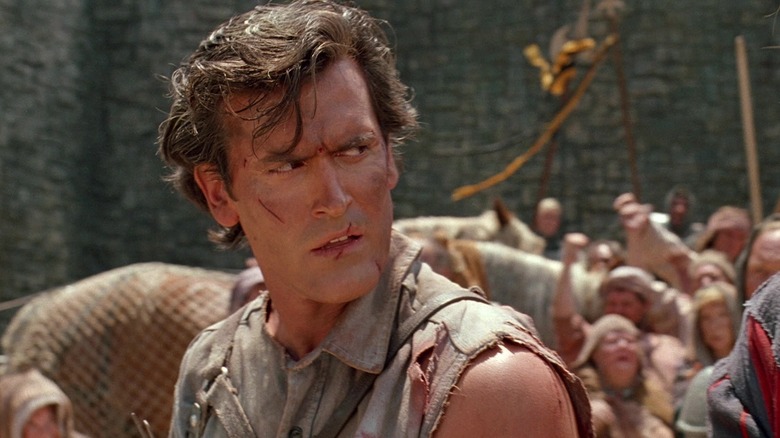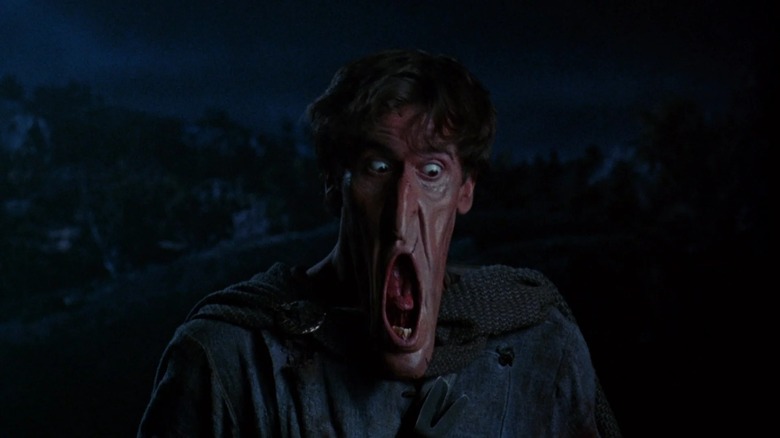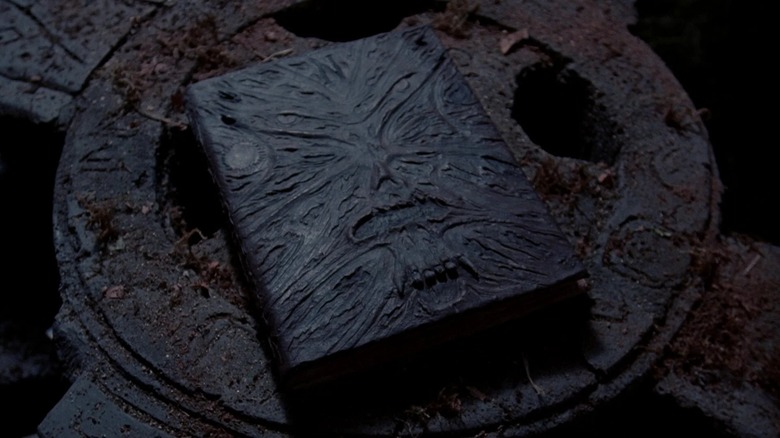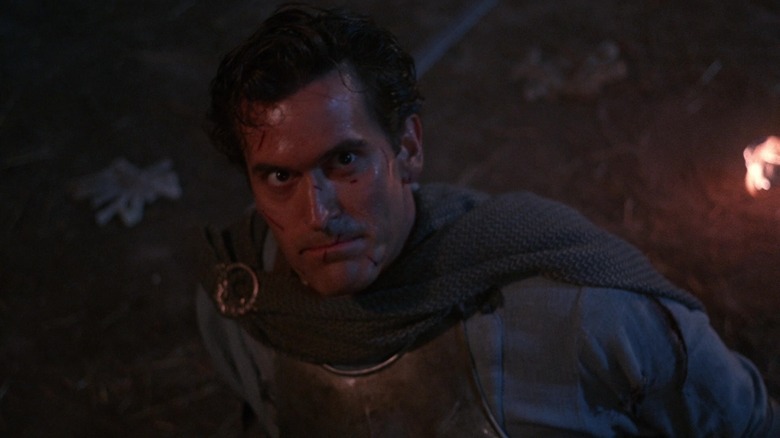Army Of Darkness Is Everything Great About Director Sam Raimi Rolled Into One Package
The "Evil Dead" trilogy is definitive proof that director/actor duo Sam Raimi and Bruce Campbell are a match made in bloody heaven. The original film of the franchise, 1981's "The Evil Dead" was Raimi's directorial feature film debut that was shot on a measly $375,000 budget, but would quickly earn itself cult status through its NC-17 rating and oppressive, nihilistic atmosphere. The film's premise was simple, following five college students who unleash something demonic and malicious during their stay in their isolated cabin in the woods. Once all hell breaks loose, Ashley "Ash" Williams (Campbell) is the last man standing amongst the wrath of the Deadites.
Years later, Raimi would return with "Evil Dead II," which centers the series once again on our survivor Ash, but also most notably brought the camp factor that the series would become known for. It's the fan-favorite of the entire franchise — delivering an over-the-top, hyper-stylized thrill ride in just a little under 90 minutes. In the final moments of "Evil Dead II," Ash is transported back in time and stranded in the Middle Ages, a wacky cliffhanger that sets the stage for the black sheep final entry of the "Evil Dead" trilogy.
This week marks the 30th anniversary of 1992's "Army of Darkness," and although it is the biggest departure in tone and setting for the franchise, it stands as a shining example of everything that's great about Sam Raimi's off-kilter and eclectic style. It's a pastiche of medieval fantasy aesthetics, it's a morbid take on slapstick comedy, but it's also true to the filmmaker's indie horror roots, and remains a wonderful genre-mashing flick in its own right.
Campbell perfectly sells Raimi's unique sense of humor
So how exactly is "Army of Darkness" the black sheep of the original franchise? For starters, the film largely departs from the oppressive and claustrophobic cabin in the woods setting of the first two movies and opts for something grander in scale, a mystical version of 1300 A.D.
Throughout the previous "Evil Dead" movies, Ash is never given a moment of peace. Here, we follow him on his "fish out of water" journey to survive the wrath of the Deadite army and search for the only thing that can transport him back home: the cursed book of the dead, the Necronomicon. Even though "Evil Dead II" was the sequel that elevated the franchise to camp horror status, "Army of Darkness" dials the absurdity of the series to 11. Ash's various antics in this fantasy medieval setting aren't just campy, they're downright cartoonish.
The juxtaposition between the juvenile, humorous moments of slapstick comedy and an arresting, gothic atmosphere is a joy to watch unfold. It might not be Raimi's scariest film, but he successfully demonstrates in "Army of Darkness" that both horror and comedic elements can be used in harmony to elevate one another.
Of course, it helps that Raimi's muse whom he built this entire trilogy off of is one of the best physical actors in the game. Bruce Campbell's performance in "Army of Darkness" is a career-best, somehow authentically embodying a strong, capable action hero and a bumbling doofus in equal measure. The Ash Williams we fondly remember in pop culture, with his "boomstick," chainsaw arm, and colorful personality is fully imagined here even more so than all other "Evil Dead" entries before it.
Raimi's roaming eye is a character in itself
"Army of Darkness" is also by far the most expensive of the original trilogy, with Raimi coming right off the box office success of his film,"Darkman." The third "Evil Dead" film was shot in California for a budget of $11 million (more than three times the cost of "Evil Dead II"), and yet, it's still impressively chock-full of Raimi's scrappy, low-fi sensibilities.
Each entry in the "Evil Dead" trilogy feels like a deeper, gradual descent into madness. We as the audience are locked into Ash's state of mind, "Army of Darkness" feels like the apex of Raimi's chaotic, unhinged style. In a Raimi film, he commands the camera with such erratic swagger that he turns his eye into a character in its own right. All those Raimi trademarks: the crash zooms, and the free-flowing way the camera "floats" through the film's various settings as if it's a wandering spirit. These are ultimately the kind of sensibilities Raimi had developed as a low-budget independent filmmaker being creatively applied to something higher scale.
Knowing in retrospect that Raimi would briefly step away from genre filmmaking to pursue his next few features, "The Quick and the Dead," and "A Simple Plan," it feels as though Raimi threw his entirety into "Army of Darkness." A graveyard full of skeleton puppet hordes, over-the-top gore and violence, and a full-on Deadite war presented with his signature crude sense of humor makes this film so distinctively "Raimi."
An unexpected, ambitious conclusion to the trilogy
At the end of the day,"Army of Darkness" might not be the typical horror fan's answer when they're asked what the best "Evil Dead" film is, that honor is usually reserved for "Evil Dead II." While it's still well-admired, it's also much more divisive than the other entries. There are even four different versions of the film with tons of altered content, as well as two different endings that have their own packs of loyal defenders.
It's far from what fans initially expected from a third "Evil Dead" — the film has much less scare factor than "Evil Dead II," and is a large step away from the unique sadistic quality of the original "The Evil Dead." However, "Army of Darkness" is still a quintessential Sam Raimi film. The fact that it distinguishes itself so much from the rest of the franchise is not a weakness, it's an enduring strength that has allowed it to stay memorable for 30 years.
As the most expensive "Evil Dead" film at the time, "Army of Darkness" marked a transitional point in Raimi's career from an independent filmmaker to a studio collaborator. The result is a wacky ride that takes Raimi's off-kilter trademarks and uses them to bend the rules of the genre, from horror and comedy to supernatural fantasy. To us, that's pretty groovy.



